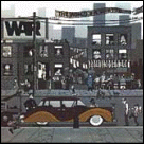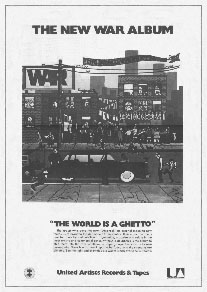![]()
  |

The World Is a Ghetto
War
United Artists 5652
Released: November 1972
Chart Peak: #1
Weeks Charted: 68
Certified Gold: 12/13/72
 War has progressed far and fast since they disassociated themselves with Eric Burdon, with whom they had committed the all-time War atrocity, "Spill The Wine." Relieved of the necessity of shouldering this Burdon, they've developed a full, luscious sound that's engagingly funky. All Day Music saw the evolvement of this disctinctly urban sound to a point just short of proficiency -- War could talk but hadn't yet mastered the language. With The World Is a Ghetto, they edge even closer to total mastery of their music as they attempt to use it to communicate the essence of ghetto life.
War has progressed far and fast since they disassociated themselves with Eric Burdon, with whom they had committed the all-time War atrocity, "Spill The Wine." Relieved of the necessity of shouldering this Burdon, they've developed a full, luscious sound that's engagingly funky. All Day Music saw the evolvement of this disctinctly urban sound to a point just short of proficiency -- War could talk but hadn't yet mastered the language. With The World Is a Ghetto, they edge even closer to total mastery of their music as they attempt to use it to communicate the essence of ghetto life.
 Click image for larger view. |
"City, Country, City" is a tour de force energizer in which everybody gets his musical rocks off. Through a series of solos ahead of varying rhythmic percussion accompaniment, War attempts to convey the hustle and bustle of a ghetto day, sandwiched between the comparitive calm of morning and night. It works well despite one terrible flaw, a total failure to communicate the desperate urgency of the situation. Somehow the boiling rage and pent-up frustration never seem to surface. By totally ignoring the blues heritage so richly ingrained in ghetto life (a major component of Savoy Brown and Santana in similar albums), War ends up conveying the mistaken impression that ghetto-dwellers are content with their lot. Given the fact that even black ghetto youth are similarly ignoring this heritage, the absence of a significant blues component in War's music is understandable, even factually accurate. Nonetheless, it's regrettable.
"Four Cornered Room" is a Temptationesque choral ballad, mildly interesting but hardly worth the eight and a half minutes devoted to it. But the title track is simply the most successful use of the "Groovin'" motif since the Rascals tantalized urban America with the prototype. A study in casual, laid-back musical discipline, it soothes savage passions, lulling them to sleep to be awakened only by the stark, sudden refrain, "the world is a ghetto." Charles Miller's sax solo is magnificent, as definitive a statement of emotion as can be imagined.
While they've yet to reach perfection (as they insist on demonstrating with self-indulgent crap like "Beetles in the Bog"), War has reached the point where they're becoming a significant force in the jazz and soul fields. Add a pinch of da blooze and they could well be artistic knockouts.
- Gordon Fletcher, Rolling Stone, 3/1/73.
The first side of this album is marvelous, a stunning combination of Latin, rock, jazz, and soul, performed with faultless technique matched with sensitivity and fire. "The Cisco Kid" and "Where Was You At" are presented with such robust energy and brilliance of performance that they seem to be better tunes than they really are. "City, Country, City" is a breathtaking instrumental. All three of these performances show War to be one of the tightest bands ever. Huzzahs for all concerned, but especially for the reed work of Charles Miller, Lonnie Jordan's organ and timbales, Papa Dee Allen's congas and bongos, and Lee Oskar's amazing harmonica. The first side has everything: wit, discipline, audacity, and powerhouse funk.
Pay no attention, therefore, to the second side, which is more or lest standard "soul" with pop and jazz elements. "Four Cornered Room," "The World Is a Ghetto" (aw, c'mon fellas, it isn't), and "Beetles in the Bog" (which is so bad I can only describe it as sloth-rock) are all beneath the band's talents. But what a treasure side one is!
- Joel Vance, Stereo Review, 5/73.
Sparked by their current single and title cut, War have come up with an excellent package that is destined for big sales. In addition to "The World Is a Ghetto," entry also includes "The Cisco Kid" and "Where Was You At." The 13:08 "City Country City" is an excellent example of talent in the group.
- Billboard, 1973.
According to all my own theories, I should love this big Afro-roots band with the number one album, but it's hard. Jazz pretentions are one problem -- "City, Country, City" has a firm bottom, but it's thirteen minutes long, and up top is mush. And if "That's What Love Will Do" was Vanilla Fudge, "Four Cornered Room" makes me think they're trying to start their own genre -- blackstrap-rock, they could call it. B
- Robert Christgau, Christgau's Record Guide, 1981.
War hit its peak with this 1972 album, the only one they ever released that topped the pop charts. The title track was a triumphant blend of great exchanges and unison vocals, plus concise and spirited musical contributions all around. It also contained the delightful "Cisco Kid" and elaborate "City, Country, City," plus the curious "Beetles in the Bog." Harmonica player Lee Oskar and percussionist Papa Dee Allen were at their best, as were keyboardist Lonnie Jordan and saxophonist/flutist Charles Miller. * * * *
- Ron Wynn, The All-Music Guide to Rock, 1995.
The World is a Ghetto has "The Cisco Kid" and the pointed, poignant title track as cornerstones for another superlative War album. * * * *
- Lawrence Gabriel, Musichound Rock: The Essential Album Guide, 1996.
Multiracial and multitalented Californian band War had begun their days as ex-Animals singer Eric Burdon's backing band, but after two successful albums with him, the Geordie dropped out of an American tour mid-way through. Their debut solo album, War, did nothing, their second, All Day Music, had cracked the charts in 1971 and gone gold. The World Is A Ghetto went to No. 1. A groundbreaking album, it mixed funk, blues, jazz and prog rock to be downbeat and stretched songs out to ten (title track) and thirteen minutes. ("City, Country, City"). Only Sly Stone and George Clinton were doing similar things at the time, though James Brown (Hell) and others would soon follow suit. Their music was eclectic, of the street. They would go on to cut seminal dancefloor -- "Me & Baby Brother," "Lowrider," "Why Can't We Be Friends?." Their musical dexterity and lack of a clearly definable leader combined with a beat and rhythm ensured that War have been much sampled by the East Coast rap fraternity in the 80s and 90s.
- Collins Gem Classic Albums, 1999.
It seems unfathomable today that War's The World Is a Ghetto was the best-selling album of 1973, a triple-platinum chart-topping blockbuster back in the days when few albums even went gold. Released in late '72, War's fifth album in three years had only six songs, three of them more than eight minutes long, all recorded live in the studio by six black Americans and one Danish harmonica player, who had the biggest Afro in the band. None were polished singers, and their sound was as much Latin jazz as it was funk or R&B, their sensibility more FM rock than AM pop.
But this was the era when progressive black music was pop, when Stevie Wonder and Curtis Mayfield sang about inner-city realities on rock stations, when sprawling bands such as Kool and the Gang were stretching out with abstract vibes, ensemble rhythms and jazz harmonies. War went further in more directions than their peers while presenting a unified groove that worked as well in flourescent-lit bedrooms as it did on proto-disco dance floors.
Further reading on Super Seventies RockSite!: |
- Barry Walters, Rolling Stone, 8/22/02.
A band of badasses doing a Latin-funk song about a Latino TV show from the Fifties -- that was "The Cisco Kid," and the band was War, L.A.'s answer to Parliament-Funkadelic. But War were serious: The title song is a sober reflection on inner-city life that hangs in the air like smoke from a riot.
The World Is a Ghetto was chosen as the 449th greatest album of all time by the editors of Rolling Stone magazine in Dec. 2003.
- Rolling Stone, 12/11/03.
By the early 1970s, urban life in America was a dichotomy of experience, particularly Los Angeles -- the dreams of Hollywood contrasted sharply with the realities of life for growing Latino and African-American populations in the east and south of the city. While such a divergent culture created tension (with the 1965 Watts riots still stinging the collective memory), it also provided a fertile breeding ground for music, informing the growth of adventurous bands such as Sly And The Family Stone and War.
A convergence of jazz, funk, rock, and Latin influences, War had scored a hit with "Spill The Wine," under the sponsorship of former Animals front man Eric Burdon. Continuing as an independent outfit, the seven members of the band showed increasing promise in their first two albums, but The World Is A Ghetto realized their full potential. While the title suggested an overt political statement, Howard Miller's cover design captured the album's lighthearted vibe -- a Rolls Royce stuck in the ghetto with a flat tire. Indeed, the Latin-flavored "The Cisco Kid" (a tongue-in-cheek homage to the heroic 1950s movie caballero) and the funky "Where Was You At" are as apolitical as it gets, celebrating life rather than preaching an agenda. Even the lyrics of the title track offer an optimistic message of love emerging from the overpowering city smog.
The remarkably positive reception of the album (it was the best-selling record of 1973) illustrated how well War had captured the urban experience. While they would enjoy success throughout the decade, Ghetto remains their most cohesive and satisfying work.
- Tim Sheridan, 1001 Albums You Must Hear Before You Die, 2005.
![]() Reader's Comments
Reader's Comments
No comments so far, be the first to comment.